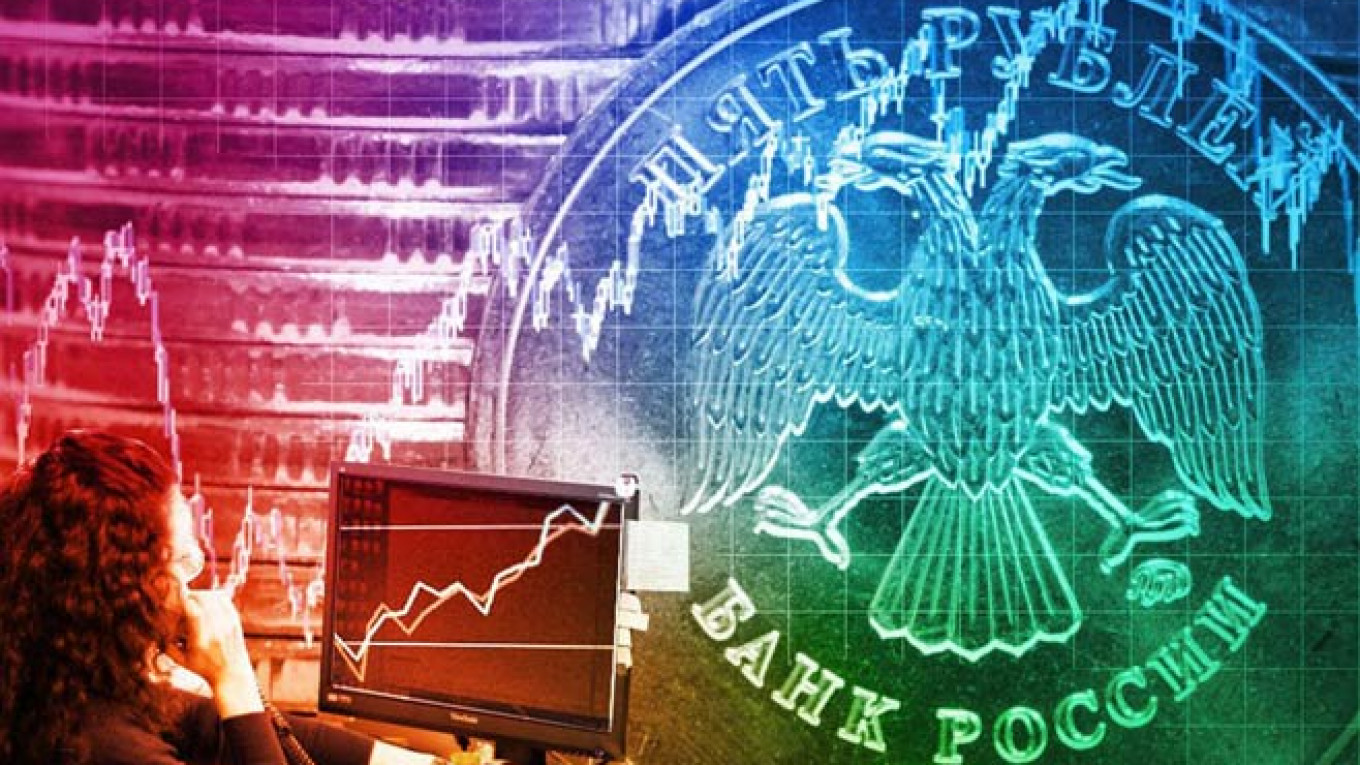Ever since March 1, when the first steps toward Russia annexing Crimea were set in motion, economists were united in the opinion that the Kremlin's actions would hurt the country's economy. On March 3, the MICEX equity index fell by more than 10 percent, and the Central Bank was forced to hike interest rates and spend almost $10 billion to stabilize the ruble's volatility.
At the same time, however, markets have been a lot less volatile than expected, and the economic indicators for March have been no worse than had been expected before the Ukraine crisis escalated on that fateful weekend. So, were the warnings of collapse in the economy, the currency and equities exaggerated, or have we only had a reprieve and worse is yet to come?
The honest answer is that this is a tough question to answer right now. What happens next on the ground in eastern Ukraine will certainly have a bearing on whether the U.S. and European Union impose further, tougher economic sanctions. If they do, then capital flight will increase even more, and investment spending by the private sector will continue to shrink. Another unknown, but critical factor in the answer is where the price of oil trades through the course of this year. Higher budget spending can certainly offset some of the negative effects of lower private sector activity.
The Economic Development Ministry stated last week that first quarter growth in the economy was only 0.8 percent on a year-on-year basis. But that is exactly the same growth recorded in the first quarter of last year. The Federal Statistics Service recently revised the original estimate of first quarter 2013 growth down from 1.3 percent to 0.8 percent. But the first quarter growth compares badly with the 2 percent growth reported for the last quarter of 2013. Still, that is what we had expected as the year started, and it seems that the crisis has had no material impact on some key parts of the economy so far. For example, one of the major contributors to growth is retail spending and, through March, the volume of retail grew 4 percent with nonfood sales rising by 6.9 percent.
The numbers in the March macro report look to be no worse than expected on a first reading. But the foundations are unstable. Last month, retail sales rose for two reasons, which may prove to be temporary. There was a one-off increase in public sector pay, which helped boost real wage growth in March to 3.1 percent over the same period last year. Second, consumer inflation is rising as a result of the weaker ruble and rising import prices. Inflation is now running at an annualized 7 percent and is very likely to rise toward 7.5 percent in the coming weeks. Buying consumer goods ahead of an expected price rise is a standard response and usually proves temporary. The third reason for the better-than-feared macro performance last month was the spike in federal budget spending, which increased by almost 13 percent in March and rose just shy of 10 percent for the quarter. The government injected extra money into the economy to prevent a collapse.
The government can afford to take that action because budget revenues are higher than expected thanks to the combination of high oil prices and a weaker ruble. Economic Development Minister Alexei Ulyukayev said he estimated that the budget will benefit by 900 billion rubles ($25 billion) this year assuming the current oil price and ruble-dollar exchange rate remain as they are today. Ulyukayev is pushing for that money to be made available for extra state spending to support the economy. Finance Minister Anton Siluanov takes a different view and wants to preserve the so-called fiscal rule, which was put in place to control budget spending and to divert all extra oil revenues into one of the sovereign wealth funds. It certainly seems as if the Finance Ministry is on the losing side of that debate for now.
It is difficult to calculate exactly what impact Western sanctions placed on Russia are having on the economy. The direct impact is quite small as the sanctions, thus far, only affect a small number individuals and one bank. In theory, that means zero impact, but in practice, the story is different. The indirect impact is a lot more noticeable. Capital flight in the first quarter was $51 billion, close to the total outflow through all of 2013. This means a loss of $51 billion that might have been used for investment in the economy. Investment spending fell 4.8 percent in the latest quarter, and that hurts the economy for the longer term. There is also plenty of anecdotal evidence of "self-sanctioning" by foreign companies who are fearful of tougher sanctions to come. Clearly, the consequence of delayed trade deals and delayed investment spending is net negative.
The ruble exchange rate has reflected investor and business concerns better than other asset values, and the government is most concerned about this indicator. The ruble fell 9 percent against both the dollar and the euro through January and February as investors worried about the slowing economy and the risk that the current account may slip into a deficit for the first time in 15 years. The Central Bank moved quickly to protect the ruble on March 3 and since then has been active in the market, trying to reduce its volatility. Although the Central Bank has been mostly successful — the ruble is actually up 0.7 percent since the start of March — the ruble exchange rate is very sensitive to political news, trading as low as 36.6 against the dollar in mid-March when risk perception was at its highest. An escalation in sanctions risk will send the ruble to that level again, or perhaps even lower. On the other hand, a calming of the crisis will likely see a return to an exchange rate of 35 rubles to the dollar.
This is the hardest year since 1999 to forecast macro indicators or the currency. That is because politics is the main driver. Ratings agency Moody's recently cut its growth forecast for 2014 to minus 1 percent. The Finance Ministry said the growth rate may be between 0.5 and 1.1 percent.
The International Monetary Fund has a forecast of 1.3 percent growth. The key variable assumptions are sanctions, the ruble exchange rate, inflation and capital flight. The price of oil will likely be the more critical element since oil revenues, which make up a significant part of the federal budget, will determine how much extra the government can spend to compensate for declining private sector investment.
The first quarter performance was not as bad as expected only because high oil revenues allowed higher budget spending and a sanctions list that is tougher in intent than in impact. This could change quickly if the efforts to forge a political deal fail and sanctions become more directly disruptive for the economy. Continuing to rely on high oil revenues to bail out the economy and the government is an increasingly dangerous risk.
Chris Weafer is senior partner with Macro Advisory, a consultancy advising macro hedge funds and foreign companies looking at investment opportunities in Russia.
A Message from The Moscow Times:
Dear readers,
We are facing unprecedented challenges. Russia's Prosecutor General's Office has designated The Moscow Times as an "undesirable" organization, criminalizing our work and putting our staff at risk of prosecution. This follows our earlier unjust labeling as a "foreign agent."
These actions are direct attempts to silence independent journalism in Russia. The authorities claim our work "discredits the decisions of the Russian leadership." We see things differently: we strive to provide accurate, unbiased reporting on Russia.
We, the journalists of The Moscow Times, refuse to be silenced. But to continue our work, we need your help.
Your support, no matter how small, makes a world of difference. If you can, please support us monthly starting from just $2. It's quick to set up, and every contribution makes a significant impact.
By supporting The Moscow Times, you're defending open, independent journalism in the face of repression. Thank you for standing with us.
Remind me later.








